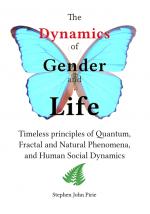A while back I posted some ideas concerning the habit of categorising people into various groups — tribes, astrological signs, enneagram and other groupings.
My anecdotal evidence is quite consistent — women are far more likely than men to use or abide by astrology as a form of "making families" of people. Men, on the other hand, typically seek to establish some sort of pecking order, or where one is in the structure of things. Hierarchy (vertical categorisation) is more their focus, as opposed to the feminine for horizontal non-hierarchical groupings (families, star signs, etc). As some have quipped, men build higher walls (à la castles), women build longer tables (with which to share).
As I've explained previously -- women tend towards the wave-nature of the fundamental wave-particle duality of life. The wave-nature is characterised by a bias towards forming groups, tribes, communities, families, harems, herds etc. Astrology simply gives people — particularly women — a 'framework' to put people in groups (tribes, families). In other words, it's generally a woman's penchant (and prerogative) to "make families" of people they meet, by grouping them in various astrological categories.
Even though flawed in principle, it is the process of "tribalising" that counts, not how correct, effective or productive the end groupings. As a general rule women are far more comfortable with men who are in some relationship (e.g. married) or who are 'tribalised' — versus the "lone wolf".
All this got me thinking, "why is it so difficult for women to appreciate raw-individuality, to the extent of not needing to tribalise people"? No one is entirely wave-natured. We're all a combination of both individual-particle and collective-wave nature. In other words we are all individuals while being 'community melded'. So why the difficulty for women to 'get it'?
Then I remembered that it hasn't been all that long since women gained a greater sense of themselves (allowed to vote), and other hallmarks of taking responsibility for individuality.
However, our culture still sees women as the primary carers, and the 'nicer sex'. In effect women still aren't seen as individualistic as men. Hence the blind obedience to such belief-systems as astrology and numerology which give voice to the desire to subsume individuality to tribes and groups.
It's reliance on past-based belief-systems that is being revealed when we fail to honour and respect the rambunctious, changing and unpredictable nature of individuality.
Does it help to tribalise people? Not really. It might give relief and comfort in feeling that one belongs, and some sense of order and structure for those who believe in astrology. But in not being effective, it only ends up confusing and frustrating those who subscribe to such a system. Worse still, it undermines our ability to own and choose our wellbeing and circumstances — it makes victims out of those who believe ... they're 'victims' to the planetary alignments and to some obscure rarely-remembered event (our birth).
"Your individuality comes first. You have certain characteristics of your own. These place you in a certain position ... your individuality places you in a particular family or species of consciousness."1
So yes, the characteristics of our desired individuality might put us in certain groups, but to look for which group one belongs to is 'putting the cart before the horse'. It's the individual's choice to belong that is central.
And that choice can easily change, and for the health of society, must be allowed to change. Those who were born 'Taurus' can, if desired, choose an entirely different character that is identified as being ... say Libra, or Capricorn, or whatever is desired.
Individuality comes first. Groupings follow our choices.
Which group, which you?
Your choice.
Update
ps. speaking of subsuming individuality to tribes and groups, this is starkly exposed by those who believe in the 100th monkey phenomena (the Borg Principle).
- 1. The Unknown Reality: Vol. II, A Seth Book (by Jane Roberts)
